Law School serves community on Martin Luther King Jr. Day of Service
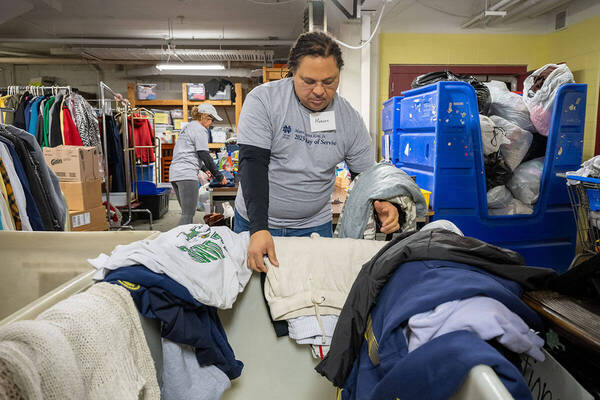
“Everybody can be great, because everybody can serve.”
In the spirit of that call to action from Dr. Martin Luther King Jr., more than 100 Notre Dame Law School students, faculty and staff spent time on Jan. 16 serving the greater South Bend community by volunteering for local nonprofit organizations during the Law School’s second annual Martin Luther King Jr. Day of Service.
The volunteers made an immediate impact by preparing 5,000 meals, assembling 100 personal care kits, sorting 500 articles of clothing, planting 600 seedlings for future food and distributing 250 donations — and this is just a sampling.
The University of Notre Dame announced last year that Martin Luther King Jr. Day would be a holiday to allow members of the Notre Dame community to honor King’s legacy in their own way. The Law School started its own tradition of honoring King’s dedication to service and fight for racial justice by offering the Law School community the option to participate in a variety of service projects.
The idea for the Martin Luther King Jr. Day of Service was initiated by G. Marcus Cole, the Joseph A. Matson Dean of Notre Dame Law School.
“We started the Martin Luther King Jr. Day of Service as a way for us as a law school community to come together to give back in service to the community and in service to God,” said Cole. “As a Matthew 25 law school, Jesus commands us to feed the hungry, clothe the naked and visit the prisoners. We are trying to be good stewards of the blessings we have been given, and also use the opportunity we have to serve others, not sometime in the future, but to serve others right now.”
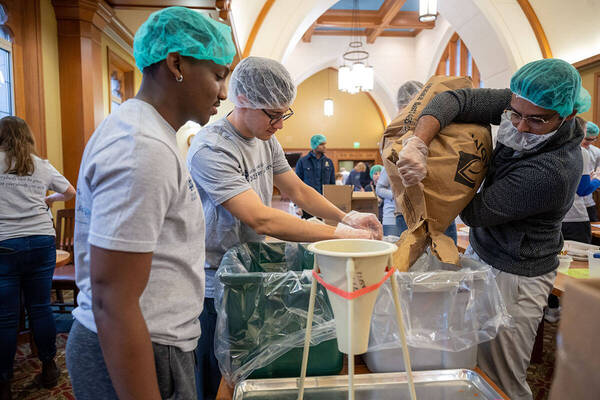
Some of the service projects were completed at the Law School, while other volunteers served at off-site locations.
More than 30 volunteers worked together in an assembly line in Eck Commons to pack meals for Pack Away Hunger. The organization’s mission is to eliminate hunger in Indiana and around the world through nutritious food, education and service.
Kathryn Hawkins, a 2002 graduate of the University and volunteer with Pack Away Hunger, led the group of ND Law students, faculty and staff.
“In northwest Indiana, nearly 100,000 individuals are food insecure, meaning they lack access to enough good, nutritious food for themselves and their families. Many people who are food insecure don’t qualify for government assistance, and must turn to food pantries,” said Hawkins. “The meals packed at this event will provide warm, healthy meals.”
The meals, vegetable soup starters, were assembled at the Law School and delivered to the Clay Church food pantry in South Bend.
Adem Osmani, a first-year law student who helped prepare the meals, said, “I am proud that the Law School provides opportunities for law students to serve the South Bend community. It is important that we give back and understand the importance of service while we are law students and preparing to be future attorneys. Service is an excellent way of honoring the legacy of Martin Luther King Jr. and pursuing our mission of becoming a ‘different kind of lawyer.’”
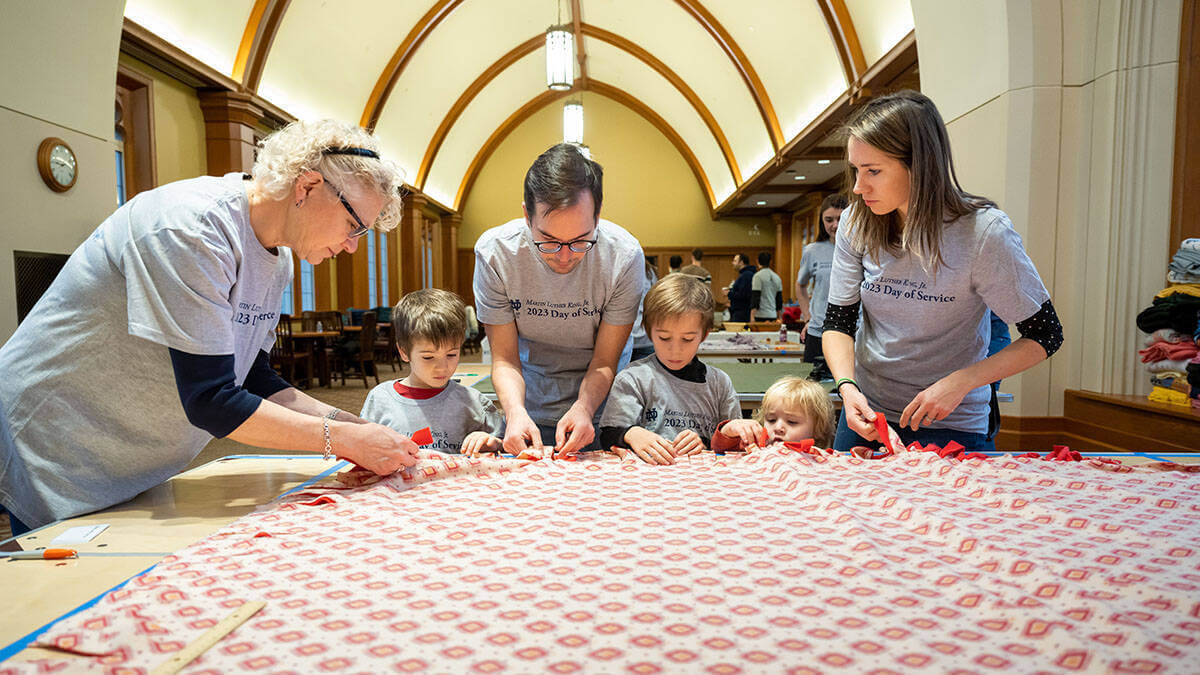
Second-year law student Owyn Ferguson also worked on the Pack Away Hunger assembly line.
“I appreciate going to a law school that acknowledges this day not simply as a holiday but as a ‘day on’ and that there is some type of obligation to use the time to serve others,” said Ferguson. “That principle threads through what the Law School encourages already — to use your gifts and opportunities for the betterment of others.”
Ferguson also thought that it was a great opportunity to do service work alongside his peers.
Another project at the Law School was making no-sew fleece blankets for Ronald McDonald House Charities of Michiana, Dismas House, St. Margaret’s House and the Center for the Homeless.
Third-year law student Carol Graffeo was one of the volunteers at the blanket-making station. The Ronald McDonald House was the charity her sorority supported when she was in college, so she saw that opportunity as a perfect fit.
“I thought the day of service was a great way to start off my last semester of law school with the right mindset,” said Graffeo.
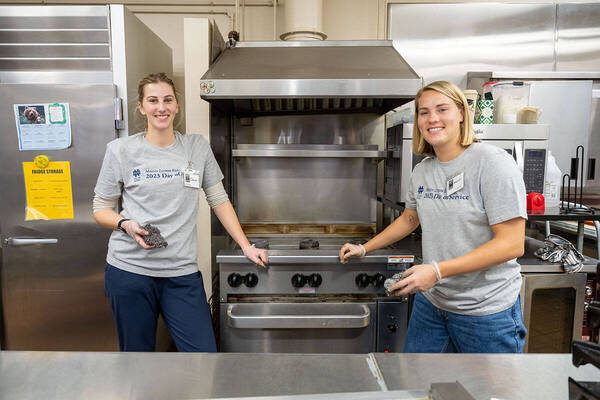
Volunteers also assembled personal care kits for the residents of St. Margaret’s House, a day center for women and their children who live in economic poverty.
Members of the Law School community brought in hundreds of donations of sheets, pillows, blankets, towels, gloves, coats, activity books and personal care items for the Center for the Homeless, Real Services and Dismas House. Volunteers on-site organized those donations and delivered them to the various organizations.
One of the remote sites for volunteers was St. Margaret’s House, where volunteers organized clothing that women who are part of the St. Margaret’s community can shop for free. Another team of volunteers did a deep clean of the kitchen. St. Margaret’s House feeds up to 100 women and children a day for breakfast and lunch, and provides a safe and nurturing environment for respite.
The staff at St. Margaret’s House all echoed how much dedicated volunteer work helps their mission, and how thankful they are for the volunteers who came to serve.
“Part of the reason I came to Notre Dame was because it was founded on service and its mission of educating ‘a different kind of lawyer,’” said second-year student Claire Ramsey, who helped clean the kitchen. “This day of service is a great opportunity to expand the Notre Dame community into the South Bend community and make sure we are carrying out the Law School’s mission off-campus as well.”
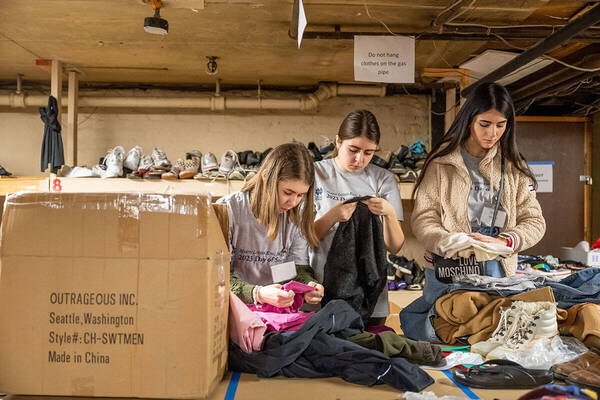
Fifteen volunteers spent time at the Center for the Homeless working in their donation room, sorting and organizing hundreds of clothing items for children and adults.
First-year student Nick Munsen decided to volunteer at the Center for the Homeless because he believed the work there captures a major part of the teachings of King, especially of addressing inequalities.
“Racial and wealth inequality are closely tied together in our community in South Bend and across the nation. In serving the economically marginalized here, we also address a key consequence and driver of racial inequality,” said Munsen. “This kind of service reminds me that, as law students, we have been given opportunities many others have not, and must use our skills for the benefit of those most in need. Not participating in direct service poses a real risk to ourselves and to society as a whole, as we need to be consistently reminded of our mission. Service reminds me what ND Law is all about.”
Adriana Hrytsyna, one of three exchange students this semester from Ukrainian Catholic University, also worked at the Center for the Homeless and said, “Being from Ukraine, we volunteer a lot. We have a lot of experience and this is an opportunity to share it with other cultures and show that all of us should do something good to make this world a better place for everyone.”
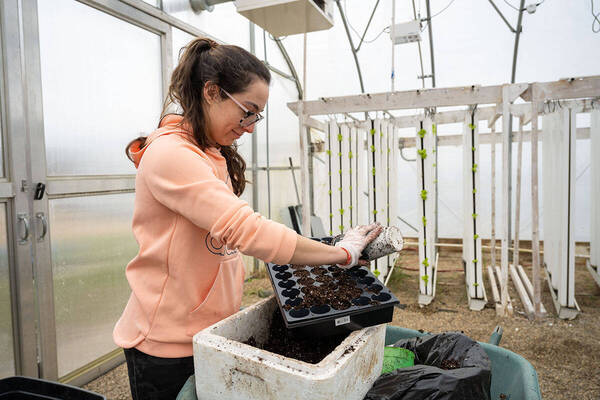
Volunteers also went to Green Bridge Growers, an innovative venture that grows fresh food and provides jobs for those with autism. There they planted seedlings, reconfigured the plumbing system in the aquaponics greenhouse, and painted the stands that house plants under cultivation.
In addition, a team of volunteers did maintenance and deep cleaning at Ronald McDonald House Charities of Michiana.
The day of service was not just limited to those on the main campus. Law students studying in London with the Notre Dame London Law Programme also participated in service projects on Monday.
Eight students worked with Refuge Network UK. They packed meals and served lunch at an outdoor soup kitchen and handed out meal kits to homeless people, also known as “rough sleepers,” in various parts of London. Other volunteers worked with the Felix Project, a London-based food redistribution charity that connects the surplus produced by the food industry to the millions of adults and children in the United Kingdom who struggle to afford to eat every day.
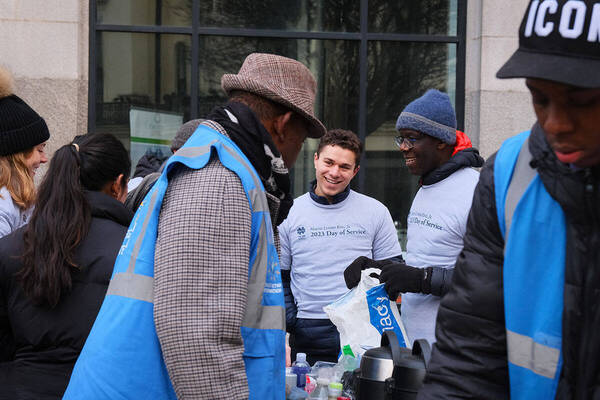
The Law School faculty participated in a number of the service projects as well. Professor Dan Kelly was among the volunteers who chaperoned children from Hope Ministries at a movie and provided them with companionship.
“My parents were active in the civil rights movement, and both attended King’s ‘I have a dream’ speech in Washington, D.C. So from a very young age they taught my brother and me the equality and human dignity of each person,” said Kelly.
“Participating in the Hope Ministries service project, and witnessing so many other service projects in which a hundred of my colleagues — faculty, staff and students — were able to participate from Notre Dame Law School, was a wonderful opportunity for prayer, reflection and service,” he said.
Originally published by at law.nd.edu on Jan. 18.
Latest ND NewsWire
- Division of Student Affairs awards scholarships to student leadersThe University of Notre Dame’s Division of Student Affairs recently recognized 15 junior undergraduate students with scholarships for the 2025-26 academic year for their demonstrated leadership and ongoing commitment to the holistic development of Notre Dame students.
- Empowering South Bend entrepreneurs: Notre Dame loan partnership aims to fuel opportunity, deepen community engagementA new community partnership will serve graduates of the University of Notre Dame's South Bend Entrepreneurship and Adversity Program, supporting small business owners who often cannot qualify for conventional financing. The initiative will empower local entrepreneurs to scale up their businesses.
- Notre Dame celebrates new pope; Father Dowd offers prayersRev. Robert A. Dowd, C.S.C., president of the University of Notre Dame, offered his prayers for Pope Leo XIV, elected by the College of Cardinals today in Vatican City as the 267th pontiff of the Catholic Church.
- Collaboration with National Education Equity Lab to Create Pathways to Notre DameA group of campus units led by Notre Dame Learning’s Office of Digital Learning are building a pathway to the University for students who might not otherwise envision themselves as candidates to attend. It is an initiative made possible through a collaboration with the National Education Equity Lab, which partners with top universities to deliver actual college credit-bearing courses and supports to scholars in low-income high school classrooms across the nation.
- Clare Cullinan named valedictorian, Bennett Schmitt selected as salutatorian for the Class of 2025Clare Cullinan of South Bend, Indiana, has been named valedictorian and Bennett Schmitt from Jasper, Indiana, has been selected as salutatorian of the 2025 University of Notre Dame graduating class. The 180th University Commencement Ceremony will be held May 18 (Sunday) in Notre Dame Stadium for graduates and guests. During the ceremony, Cullinan will present the valedictory address, and as salutatorian, Schmitt will offer the invocation.
- Notre Dame’s Fightin’ Irish Battalion receives Department of Defense award as nation’s top Army ROTC programThe United States Department of Defense honored the University of Notre Dame’s Army ROTC Fightin’ Irish Battalion as the nation’s top Army collegiate program for the 2023-24 academic year. This will be the first time the unit has received the department’s Educational Institution Partnership Excellence Award, which recognizes the program’s achievements in recruiting, educating, training and commissioning leaders of character to be the next generation of military officers.













